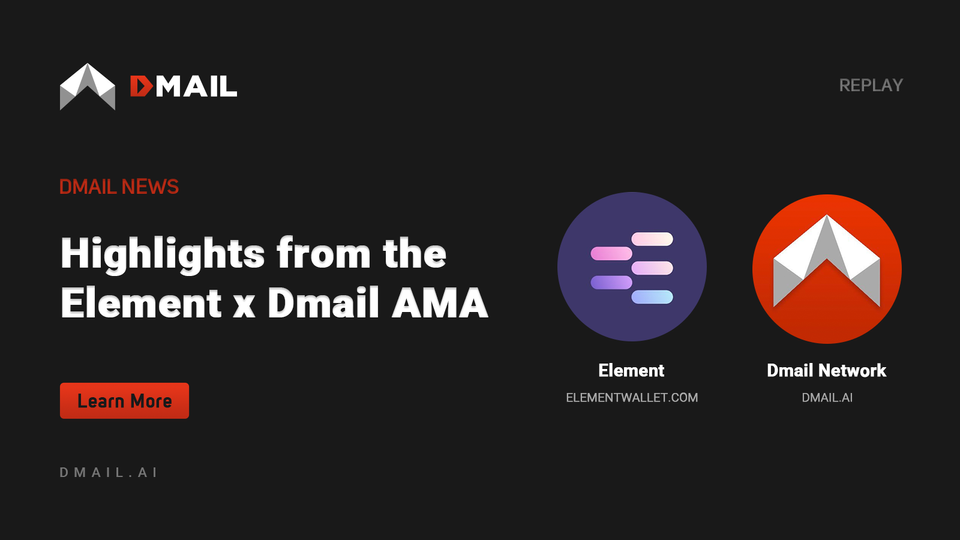Highlights from the Element × DMAIL AMA: Shaping the Future of Web3 Communication
 Dara Etuk
Dara Etuk
Introduction
On March 31, 2025, Dmail joined Element for an insightful X Space discussion on the future of decentralized communication. The session, featuring Dmail’s Dan, covered key topics such as privacy, spam protection, KYC (Know Your Customer), and scalability in Web3.
As blockchain-based solutions continue to redefine digital interactions, Dmail’s approach to messaging is gaining traction for its emphasis on privacy, decentralization, and user control. This article provides a detailed recap of the discussion, highlighting the major takeaways and Dmail’s vision for the future of Web3 communication.
The Problem with Centralized Data Sharing
The conversation began with a comparison of Web2 and Web3 messaging. Recently, Meta introduced a feature allowing WhatsApp to share user data with Facebook and Instagram through its Accounts Center. While this was marketed as a seamless integration, it raised concerns about centralized entities consolidating personal data for commercial purposes.
Dan emphasized that Dmail operates on a fundamentally different model. Unlike traditional platforms, which store messages on centralized servers accessible by corporations and governments, Dmail encrypts and stores messages off-chain, ensuring only the sender and recipient can access them. This eliminates third-party surveillance and reinforces true data sovereignty.
The takeaway? Privacy must be a core feature, not an afterthought. In Web3, users should demand control over their personal data rather than relying on centralized corporations that profit from data mining.
Tackling Spam and Phishing in a Decentralized Way
Spam and phishing attacks remain one of the biggest challenges in digital communication. In Web2, email providers use centralized filters to scan content, often at the cost of privacy.
Dmail’s approach is different:
✔️Blockchain-Verified Senders – Messages are linked to wallet addresses, preventing impersonation.
✔️Community-Driven Reputation System – Users can flag malicious actors, helping the network stay secure.
✔️PID-Based Dual Verification – A unique identifier (PID) ensures that only approved addresses can send messages, making brute-force attacks nearly impossible.
By leveraging on-chain verification instead of centralized moderation, Dmail ensures a safer messaging experience without compromising user privacy.
The Role of KYC in Web3: Optional and Privacy-Respecting
With increasing regulatory pressure, Web3 projects must find ways to balance decentralization with compliance. Many platforms are now considering KYC (Know Your Customer) requirements, but the challenge lies in implementing them without compromising privacy.
Dmail’s solution? Optional and decentralized KYC.
Users can verify their identity only when necessary, such as when accessing regulated services. However, those who prefer complete privacy can opt out. Dmail has integrated with Binance BABT, World ID, and Humanode to support privacy-preserving identity verification, allowing compliance without forcing intrusive data collection.
This approach allows Dmail to remain accessible to privacy-focused users while still meeting regulatory requirements where needed.
Scalability and Performance: Overcoming Blockchain Limitations
Scalability is a key concern for any blockchain-based service. Traditional blockchains face limitations in transaction speed, storage costs, and scalability.
Dmail overcomes these hurdles with a two-layer infrastructure built on the Internet Computer Protocol (ICP):
✔️Layer 1: ICP’s chain-key cryptography ensures high-speed transactions with minimal gas fees.
✔️Layer 2: Off-chain encrypted storage ensures messages are private and accessible only by the recipient.
Additionally, Dmail is implementing Trusted Execution Environments (TEE) to further enhance privacy and security. This architecture allows fast, cost-effective, and decentralized communication without sacrificing privacy.
Breaking Barriers: The Challenges of Adoption
While decentralized messaging offers significant advantages, adoption remains a challenge. Many users are still accustomed to centralized email providers like Gmail and Outlook, and transitioning to a Web3-native email system requires education.
Dan highlighted two key barriers:
1. Technical Complexity – Many users wrongly assume that blockchain-based communication is complicated. However, Dmail’s interface is designed to be as simple as traditional email platforms.
2. Misinformation – Some people mistakenly believe that blockchain messaging is public. In reality, Dmail uses end-to-end encryption, ensuring that only the intended recipient can access messages.
Education and user-friendly design will be crucial in bridging the gap between Web2 and Web3 communication.
What’s Next for Dmail?
Dan also shared exciting upcoming features that will further enhance Dmail’s capabilities:
✔️Cross-Chain Messaging – Users will be able to send and receive emails across multiple blockchain networks.
✔️AI-Powered Assistants – Smart inbox management and automated sorting for better efficiency.
✔️NFT Marketplace Integration – Enabling the trading and transfer of NFTs directly within emails.
✔️Dmail Subhub & RSS Feeds – A content discovery and monetization platform for Web3 creators.
✔️Enhanced Tokenization – Users will soon be able to earn and use $DMAIL tokens for premium services.
✔️Proof of Humanity Pilot – A major initiative with a leading wallet provider to establish decentralized identity verification.
These developments are set to redefine how Web3 users interact and communicate.
Conclusion: A Decentralized Future for Messaging
The Element x Dmail AMA showcased how Dmail is leading the charge in decentralized communication. By prioritizing privacy, security, and user empowerment, Dmail is creating a messaging system free from centralized control and data exploitation.
As Web3 adoption continues to grow, Dmail’s innovative approach will play a crucial role in shaping the future of communication. The ability to message securely, without surveillance or spam, represents a paradigm shift in how we interact online.
Dmail’s vision is clear: Messaging should be private, decentralized, and fully controlled by the user.
Are you ready to make the switch to secure Web3 messaging? Start using Dmail today and take control of your communication.
📌 Learn more about Dmail and its roadmap:
blog.dmail.ai
Subscribe to my newsletter
Read articles from Dara Etuk directly inside your inbox. Subscribe to the newsletter, and don't miss out.
Written by
